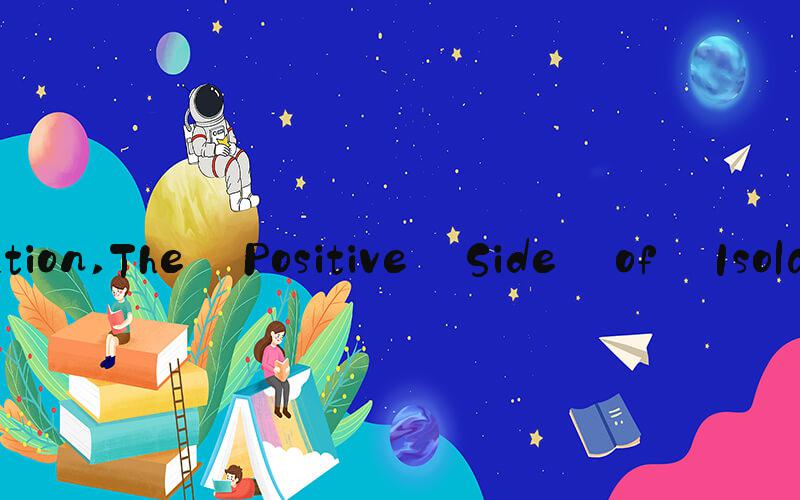 Isolation: A Necessary Evil or a Dangerous Trap?
Isolation: A Necessary Evil or a Dangerous Trap?Isolation, the act of separating oneself from others and the outside world, has always been a part of human existence. It can be voluntary or involuntary, imposed by circumstances or chosen for personal reasons. While isolation can be essential for individual growth and self-discovery, it can also lead to adverse effects on mental and physical health. In this article, we will explore the different aspects of isolation and its impact on human life.
The Positive Side of IsolationIsolation is not always a negative situation for humans. In fact, there are times when being alone can be beneficial to a person's well-being. For instance, spending time alone can help an individual focus on personal goals, identify one's strengths, and gain clarity on the direction of their life. Moreover, isolation can also provide relief from stressful situations, giving an individual time to relax and rejuvenate themselves.
For creatives, isolation may be a vital aspect of the creative process. Many writers, musicians, and artists have found inspiration in long periods of solitude. Solitude can provide the space and quiet necessary to allow creativity to thrive and grow. Finally, isolation can be a time for personal reflection, allowing individuals to think deeply about their lives and make positive changes.
The Negative Side of IsolationWhile isolation can have some positive aspects, the detrimental effects of isolation cannot be ignored. Prolonged isolation can cause significant damage to mental and physical health. Isolation can lead to feelings of loneliness, depression, anxiety, and even suicidal thoughts. Additionally, physical health can be impacted as well, especially if people isolate themselves from outdoor activities and exercise.
Isolation can also lead to the development of unhealthy coping mechanisms, such as addiction to drugs, alcohol, and other harmful substances. These habits often begin as a way to cope with the stress and anxiety of isolation and can be challenging to break. Finally, isolation can lead to the weakening of personal relationships, as individuals disconnect from their social networks and the people around them.
The Importance of Human ConnectionHuman beings are naturally social creatures, and social interaction is essential for mental and physical health. The need for social connections is facilitated by the release of hormones that promote such interactions, including oxytocin. Lack of social interaction can lead to depression, anxiety, and other negative psychological effects, compromising the individual's well-being.
The need for human interaction is not limited to the social and psychological spheres alone. There is also a significant connection between human interaction and physical health. For example, social interaction has been demonstrated to enhance the immune system and lower the risk of chronic disease.
Strategies to Avoid IsolationNowadays, there are several ways people can avoid isolation, including social media, virtual meetings, and online forums. These tools allow people to stay connected with others even when they cannot meet in person. Additionally, pursuing hobbies or interests is an ideal way to find like-minded individuals who share similar interests. Joining clubs or organizations can allow individuals to socialize, network, and find new friends.
Finally, individuals should also consider breaking routines regularly, traveling to new places, and exploring new activities outside of their comfort zone. By challenging oneself to new experiences, individuals can meet new people and immerse themselves in new cultures. Overcoming fear and taking risks are essential to avoid the isolating trap and experience the richness of life.
ConclusionIsolation can be both necessary and dangerous, and people should be mindful of the impact it has on their lives. While isolation can create opportunities for personal growth and creativity, it can harm mental and physical well-being if taken to extremes. As social beings, humans must prioritize interaction with others and cultivate positive relationships. Pursuing new experiences and stepping out of comfort zones can provide a powerful antidote to isolation, connecting people to the world around them and enhancing their lives.
